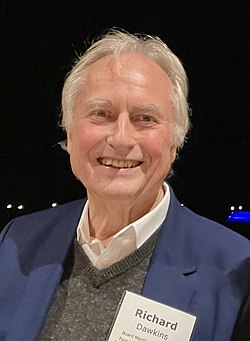Richard Dawkins Quote
The feeling of awed wonder that science can give us is one of the highest experiences of which the human psyche is capable. It is a deep aesthetic passion to rank with the finest that music and poetry can deliver. It is truly one of the things that make life worth living and it does so, if anything, more effectively if it convinces us that the time we have for living is quite finite.
Richard Dawkins
The feeling of awed wonder that science can give us is one of the highest experiences of which the human psyche is capable. It is a deep aesthetic passion to rank with the finest that music and poetry can deliver. It is truly one of the things that make life worth living and it does so, if anything, more effectively if it convinces us that the time we have for living is quite finite.
Related Quotes
Old-growth forests met no needs. They simply were, in a way that bore no questions about purpose or value. They could not be created by men. They could not even be understood by men. They had too many...
Steve Olson
Tags:
1980s, beauty in nature, ecology, forests, history, man, mount st helens, nature, trees, washington
About Richard Dawkins
Richard Dawkins (born 26 March 1941) is a British evolutionary biologist, zoologist, science communicator and author. He is an emeritus fellow of New College, Oxford, and was Professor for Public Understanding of Science at the University of Oxford from 1995 to 2008, and is on the advisory board of the University of Austin. His book The Selfish Gene (1976) popularised the gene-centred view of evolution and coined the word meme. Dawkins has won several academic and writing awards.
A vocal atheist, Dawkins is known for his criticism of creationism and intelligent design. He wrote The Blind Watchmaker (1986), in which he argues against the watchmaker analogy, an argument for the existence of a creator deity based upon the complexity of living organisms. Instead, he describes evolutionary processes as analogous to a blind watchmaker, in that reproduction, mutation and selection are unguided by any sentient designer. In his book The God Delusion (2006) he argues that a supernatural creator almost certainly does not exist and calls religious faith a delusion. He founded the Richard Dawkins Foundation for Reason and Science in 2006. Dawkins has published two volumes of memoirs, An Appetite for Wonder (2013) and Brief Candle in the Dark (2015).
A vocal atheist, Dawkins is known for his criticism of creationism and intelligent design. He wrote The Blind Watchmaker (1986), in which he argues against the watchmaker analogy, an argument for the existence of a creator deity based upon the complexity of living organisms. Instead, he describes evolutionary processes as analogous to a blind watchmaker, in that reproduction, mutation and selection are unguided by any sentient designer. In his book The God Delusion (2006) he argues that a supernatural creator almost certainly does not exist and calls religious faith a delusion. He founded the Richard Dawkins Foundation for Reason and Science in 2006. Dawkins has published two volumes of memoirs, An Appetite for Wonder (2013) and Brief Candle in the Dark (2015).
